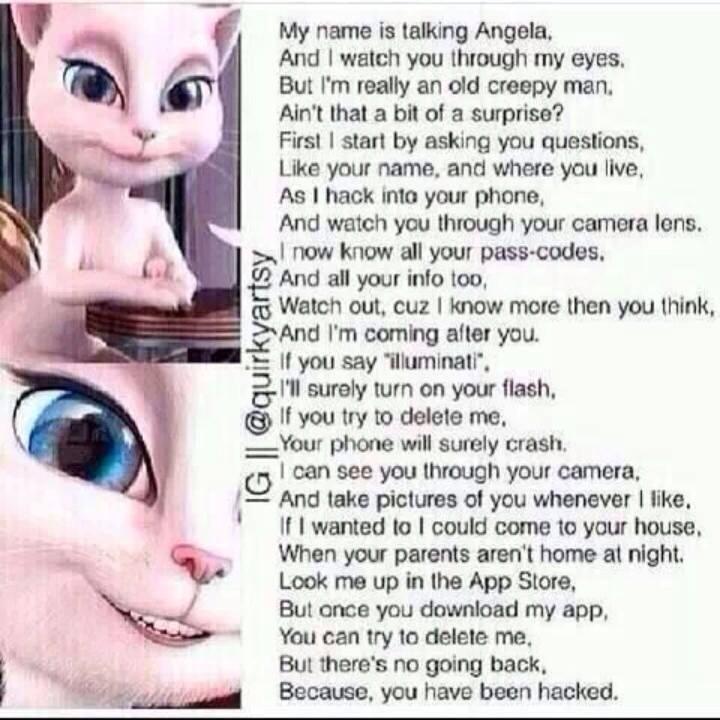If you’re on Facebook or Twitter, or even spend a fair amount of time chatting to other parents while waiting for the kids to come out of school at the end of the day, you’ll have probably heard all about Talking Angela.This app is able to come into your home, ask your children all kinds of inappropriate and personal questions and even watch them while they sleep. It’s even said to have been either hacked by a paedophile ring or made by one, I’m sure it doesn’t matter which, both are equally terrifying prospects. So how can we protect our children from the clutches of Talking Angela? First let us examine the ‘evidence’:
This rather scary status has been doing the rounds on Facebook of late:
"I cant even in words say what I just found out.. I am SHOCKED and want to tell and let my friends and family be made aware so they can make sure their children are safe!!
Angelica stayed home from school today and thank GOD she did. Because she was on her ipod playing a game called talking angela, which is similar to talking tom, anyway as she is sitting next to me this interactive cat says to her hi angelica where is your brother? She says o hes right here next to me the cat says o cool, then the cat says so what do you do for fun? Ang says I dont know, (now im being quiet and listening because I think its weird this angela cat knows she has a brother and is talking to her like a person) then its voice changes and in some weird robotic voice it says angelica when u date what do u do on your dates? She looked at me got red in the face and said nothing, then it said stick out your touunge, ill stick mine out too, it said what are some things u can do with your tounge? I can find many things to do with my tounge it said it said lets intrract wour toungues. I that point I had heard enough I zaid ang shut it off now!
I was freaked out called the police departnrnt they came to the house saif they would have the internet investigations unit and pedofile investigations unit look into it, they called me an hour latet and said something is behind that cat!!! They dont know if it is local or over seas. While the police officer was there and ang was talking to him she told the police officer saturday night her cousin and her were on the app w angela and it asked the girls their names what her brothers name was what school they BOTH went to, and it took a picture of angelica!!! This is under serious investigation right now! When I googled talking angela I cant even begin to tell you what creepy stuff came up! Google it for yourselves please!! But some things are the cat asking girls for their phone numbers! And if theyve had their firat kiss!!!
Take this app off your phone please! Theres a big chance thid cpuld be a door for pedofiles.the police said they have seen thing *like* this but never actually through a childs app but that they are not putting it past them! The girls told angela the cat on saturday their names and she had a brother and then on monday morning when angelica turned the app back on, It remebered her name and that she had a brother!!! These things ARENT supposed to ask you questions!!! and especially not questions about dating toungues or kissing!! I am disgusted! I dont feel safe at all right now! Knowing that there was some creep talking to my daughter and my neice through a talking app!!! Please if you have this app or any like it the police are saying take it off of your phone!!! Copy and share and send out PLEASE! This word needs to spread! I pray the ocean county investigators can crack this thing open!!!!!So please if your KIDS use this app please shut it down. Because SOME KIDS told them the name of the school they went to and is now on red alert at the school, and please PASS this on to ALL your friends. — feeling annoyed in Scotland."
And this image with some rather damning accusations about Talking Angela’s abilities has been widely shared too:

Let’s tackle the first piece of evidence, the Facebook status. Now this one is written by someone who is said to be ‘feeling annoyed in Scotland’ about something that happened to their child, yet they reported the matter to the ‘Ocean County investigators’, so the part of me that worked for the police in previous years would dismiss it as a piece of evidence immediately, seeing that the person writing the post doesn’t know if they live in Scotland or America, hardly a reliable witness if they can’t get that right.
The status does however raise concerns about the way in which the child referenced has been allowed to use the Internet. If she and her cousin are apparently giving out personal information online, should they even be online without additional safeguards in the first place? Where else have they given out this information and who to? The message implied in this status is that the real problem is the children in question have not received the appropriate guidance in how to be safe on Internet and the parent needs to take a look at how that is discussed and implemented at home.
The second piece of evidence really hammers the point home, seeing that it’s an image with some pretty big accusations on it. Having spent the last hour or so posing as a seven year old and chatting to Talking Angela myself, as well as having a 12 year old daughter who has been using the App on her iPod for the last few months, I’ll have a go at answering some of the questions that arise from this image.
Does it ask your name and where you live?
I was asked my name and then was asked if I’d like to stroke her. She is a cat after all so this is hardly surprising. She does a little wiggle (which some people have deemed highly inappropriate, but it’s a cartoon cat sitting at a table in a cafe, it’s hardly an over 18 film) and told me I was a cutie. I said "So are you", to which she replied "That’s a personal question. Tell me about you. I’m 18. Are you an adult too?", to which I answered that I was 7. There was no acknowledgement of my age, no questions about where I went to school, where I lived or anything else of that nature.
Does it watch you?
There has been speculation that this app can hijack your camera or watch you through Talking Angela’s eyes. If that is true then some poor paedophile had a nasty shock when he fancied a look at a 7 year old girl and instead got an exhausted 32 year old mother of two sitting there in her pj’s at 7.30am on a Saturday morning. I doubt very much he’d have bothered trying to look at the 7 year old me again! But does this carry any weight at all, could this cat have weird eyes in which you can apparently see your room or the image of a man staring out at you? Firstly computer screens are made up of pixels, there is no way that the eyes of this cat can look at you in any way. If you see your room in its eyes or the silhouette of a person staring back at you – that is called a reflection, you might want to google that rather than scare yourself with more stories about the magical powers of this talking cat.
It says inappropriate things to your child.
I asked Talking Angela numerous inappropriate questions trying to get something remotely offensive out of it. Yes it talks to you about dating Talking Tom and asks if you’ve ever had a crush on someone at school, it even says kissing Talking Tom makes her tingle all over, but try to pry or ask about sex and it won’t go any further, instead changing the subject and asking about books or films. Is talking to a five year old about tingling all over when you’re kissed by your animated ‘boyfriend’ Talking Tom inappropriate? Yes. So this app can be age-inappropriate, not suitable for younger children – but then there is a way to stop all conversations happening with Talking Angela by using the child option, which mean she remains just like her talking boyfriend Tom and just repeats what you say in a funny voice.
It/He will come to your house?
Well no one has knocked on my door, but then it does state it will come to your house when your parents are out so maybe it waits for parents to leave their children at home unsupervised. If we’re talking about 5 year olds then I’d hope it would be the police and social services knocking on the door rather than anyone else.
You can’t delete the app.
I did. I’ve tried it on facebook, my phone and the iPod and it disappears in an instant, just like any other app would if you deleted it.
It’s too intelligent to be just an app
Talking Angela is much like Siri on Apple products. For those that aren’t familiar, it’s a talking app that you can quite literally have a conversation with. My 12 year old loves it, she even quite likes insulting it just to listen to the exasperated responses and the refusal to discuss the matter further. It knows what you are saying, it can answer questions, provide you with the details of your local restaurant, tell you who your next meeting is with and put dates in your diary just by you asking it to. It does work on a script however, much like Talking Angela. It recognises certain words and responds accordingly. Technology these days is advancing at an astounding rate and Talking Angela is just an app taking advantage of that technology, not your child.
Probably the main problem with this app is the parents of the children who use it. That’s right. You and me. If we don’t know what our children are doing online, or provide suitable safeguards to protect them from apps and websites that aren’t age appropriate, then we really need to rethink the way in which we allow our children to use the Internet. If you don’t think Talking Angela is appropriate for the age of your child because it discusses things like dating and crushes you’d prefer them not to know about until later on, don’t allow them to download the app, and put in place something that controls what they can download. Don’t blame the app, the raw Internet is the world, not a children’s playground.
Having worked with the kind of people accused of making or hacking into this app while working for the police, I agree wholeheartedly that the Internet can be a scary place. However the hype around Talking Angela is just that. If you could bottle the way in which the hysteria about it has gone viral and sell it on to companies wanting to get their product in the public eye, you would be a billionaire by morning. So take a look at the app for yourself and draw your own conclusions, rather than jumping on the bandwagon. Young children are coming home from school telling parents they have to delete the app because bad men can look at them if they keep it on their phone. Is scaring our children unnecessarily really what we want to achieve?

